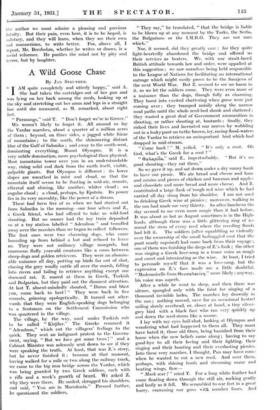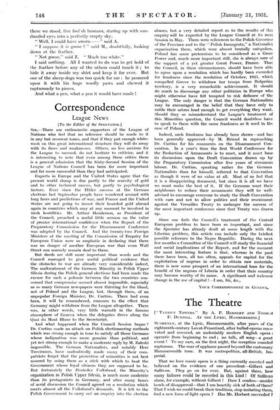A Wild Goose Chase By JAN STRUTHER.
66 T AM quite completely and utterly happy," said A. She had taken the cartridges out of her gun and was lying on her back among the reeds, looking up at the sky and stretching out her arms and legs in a straight line until she measured, as M. remarked, about eight feet.
" Parasangs," said T; " ain't forget we're in Greece."
We weren't likely to forget it. All around us lay the Vardar marshes, about a quarter of a million acres of them ; beyond, on three sides, a jagged white frieze of mountains ; to the south, the shimmering distant blue of the Gulf of Salonika ; and away to the south-west, dominating everything, Mount Olympus. It is a very subtle domination, more psychological than physical. Most mountains tower over you in an understandable way, rising solid and dark from the earth itself, visible, palpable giants. But Olympus is different : its lower slopes are wreathed in mist and cloud, so that the mountain itself seems to be floating in mid-air, remote, ethereal and shining, like another, whiter cloud ; an angular cloud ; a cloud, perhaps, by Epstein. Its power lies in its very unreality, like the power of a dream.
There had been five of us when we had started out from Salonika in the morning—our four selves and Z., a Greek friend, who had offered to take us wild-fowl shooting. But no sooner had the toy train deposited us at a toy station labelled " Adendron " and trundled away over the marshes than we began to collect followers. The first ones were two charming dogs, who came bounding up from behind a but and refused to leave us. They were not ordinary village mongrels, but enormous fluffy year-old creatures like a cross between sheep-dogs and golden retrievers. They were an abomin- able nuisance all day, putting up birds far out of shot, chasing the grey woolly cattle all over the marsh, falling into rivers and failing to retrieve anything except one drowned rat. Z. roared at them in Greek, Turkish and Bulgarian, but they paid not the dimmest attention. At last T. absent-mindedly shouted, " Damn and blast you, come back to heel ! " They were back in five seconds, grinning apologetically. It turned out after- wards that they were English-speaking dogs belonging to a Scotsman on the Settlement Commission who was quartered in the village.
The village, by the way, used under Turkish rule to be called " Kirjilar." The Greeks renamed it " Adendron," which cut the villagers' feelings to the quick. They . sent an indignant protest to the Govern- ment, saying, " But we hare got some trees ! " and a Cabinet Minister was solemnly sent down to see if they were speaking the truth. At least, that was Z.'s story, but he never finished it ; because at that moment, having walked for a mile or two along the railway track, we came to the big iron bridge across the Vardar, which was being guarded by two Greek soldiers, each with a rifle and a week's growth of beard. We asked Z. why they were there. He smiled, shrugged his shoulders, and said, " You are in Macedonia." Pressed further, he questioned the soldiers, - " They say," he translated, " that the bridge is liable to be blown up at any moment by the Turks, the Serbs, the Bulgarians or the I.M.R.O. They arc not sure which."
Nor, it seemed, did they greatly care ; for they quite light-heartedly abandoned the bridge and offered us their services as beaters. We, with our strait-laced British attitude towards law and order, were appalled at this suggestion ; we saw ourselves being held responsible to the League of Nations for facilitating an international outrage which might easily prove to be the Sarajevo of the next World War. But Z. seemed to see no harm in it, so we let-the soldiers come. They were even more of a nuisance than the dogs, though fully as charming. They burst into excited chattering when geese were just coming over ; they tramped noisily along the narrow mud paths until the whole reed-bed shook and clattered ; they wasted a great deal of Government ammunition in shooting, or rather shooting at, bustards ; finally, they risked their lives and lacerated our nerves by wobbling out in a leakypunt on to the brown, icy, racing flood-waters of the Vardar to retrieve an unimportant bird which had dropped in mid-stream.
" Come back ! " M. yelled. " It's only a coot. Oh God, what's the Greek for a coot ? "
• " (DaAaptSa," said Z., imperturbably. " But it's no good shouting—they cat them."
So we gave it up, and sat down under a dry sunny bank to have our picnic. We ate bread and cheese and ham and raisins and pieces of chicken and bananas and apple.; and chocolate and more bread and more cheese. And Z. contributed a large flask of 'rough red wine which he had carried all day slung from his shoulder. I am not used to drinking Greek wine at picnics ; moreover, walking in the sun had made me very thirsty. So after luncheon the day seemed to me even more magic than it had before.
It was about as hot as August sometimes is in the High- lands, although there was a little glittering ring of ice round the stem of every reed where the receding floods had left it. The soldiers (after squabbling so violently over the ownership of the small bedraggled coot that the punt nearly capsized) had come back from their voyage ; one of them was finishing the dregs of Z.'s flask ; the other was singing a Greek love-song in a tenor voice as rough and sweet and intoxicating as the wine. At least, I tried to persuade myself that it was a love-song, but the expression on Z.'s face made me a little doubtful. "Mademoiselle from Oea-craXoviKn," more likely; anyway, his voice was superb.
After a while he went to sleep, and then there was silence, spangled only with the faint far singing of a thousand invisible larks. The marshes lay drowsily in the sun ; nothing moved, save for an occasional kestrel sailing slowly overhead, or, closer at hand, a tiny silver- grey bird with a black face who ran very quickly up and down the reed-stems like a mouse.
I lay with my eyes half-shut, looking at Olympus and wondering what had happened to them all. They must have hated it, those old Ones, being banished from their home when the new beliefs came along ; having to say good-bye to all their loving and their fighting, their singing and their hunting and their everlasting picnics. Into these very marshes, I thought, Pan may have come when he wanted to cut a new reed. And over them, perhaps, with shining hoofs and streaming mane and beating wings, flew- " Mark over ! " cried T. For a long white feather had come floating down through the still air, rocking gently and lazily as it fell. We scrambled to our feet in a great hurry, cramming our guns with number fours. And there we stood, five foofsh humans, staring up with sun- dazzled eyes into a perfectly empty sky.
" Well, I could have sworn " said A.
" I suppose it is goose ? " said M., doubtfully, looking down at the feather.
" Not goose," said Z. " Much too white."
I said nothing. All I wanted to do was to get hold of the feather before any of the others could touch it ; to hide it away inside my shirt and keep it for ever. But one of the sheep-dogs was too quick for me : he pounced upon it with his huge woolly paws and chewed it rapturously to pieces.
And what a pen, what a pen it would have made !







































 Previous page
Previous page